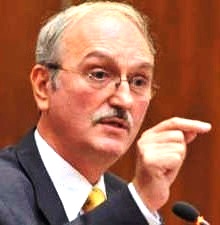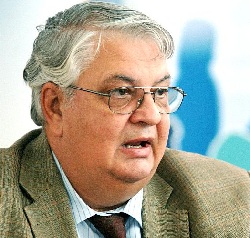 Eight months after the initial announcement on the establishment of a Sovereign Development and Investment Fund – a measure included in the government program adopted by the Parliament in January 2017 – the Ministry of Finance launched on Wednesday evening a draft law on its establishment for public debate.
Eight months after the initial announcement on the establishment of a Sovereign Development and Investment Fund – a measure included in the government program adopted by the Parliament in January 2017 – the Ministry of Finance launched on Wednesday evening a draft law on its establishment for public debate.
According to the official documents, Romanian state will be the sole shareholder of FSDI and will exercise its shareholder status through the Ministry of Public Finance.
The share capital subscribed at the date of the fund’s establishment consists of an in-kind contribution represented by the shares of some companies where the state is a shareholder and a cash contribution of ROL 1.85 billion.
To be specified: The list of state companies that will be transferred to the FSDI portfolio has not been published by the Ministry of Finance as this list is very likely to be subject of intense negotiations.
According to the Ministry of Finance’s timetable, the fund is set to become operational in 2019.
Unofficial list of state-owned companies to be transferred to FSDI portfolio
The only list available with companies in the FSDI portfolio is in a draft law that cursdeguvernare.ro published in July 2017, shortly after it had been discussed by the government in the first reading.
According to that document, FSDI will „swallow” 27 companies in which the state owns minority or majority shareholdings with an accounting value of about ROL 45 billion (EUR 10 billion euros). These companies would be:
- Engie Romania (where the Romanian state owns 34% of the shares)
- Electrica (48.78%)
- Delgaz Grid (13.51%)
- E.ON Energie Romania (31.82%)
- Biofarm (1.16%)
- Chimcomplex (12.89%)
- OMV Petrom (20.63%)
- Telekom Romania Communications (45.99%)
- Antibiotice (53.02%)
- National Company for Boiler Control, Lifting Equipment and Pressure Vessels (100%)
- Romanian Lottery (100%)
- National Salt Company (51%)
- IAR SA (72.19%)
- Oil Terminal (59.62%)
- Cupru Min (100%)
- Unifarm (100%)
- National Company of Mineral Waters (100%)
- National Company Administration of Maritime Danube Ports (92.3%)
- Company for Investment in Tourism (100%)
- Romgaz (70%)
- Hidroelectrica (80.05%)
- “Aeroporturi Bucuresti” National Company (80%)
- Nuclearelectrica (82.49%)
- National Printing House (100%)
- Maritime Port Administration Company (80%)
- Societatea de Administrare a Participatiilor in Energie (100%)
- Conpet (58.72%)
Most suspect issue: FSDI can sell shares from portfolio
FSDI aims both to develop and finance from own and attracted funds, cost-effective and sustainable investment projects in various economic sectors through direct participation or other investment funds or investment companies, either alone or together with other institutional or private investors and manage its own financial assets to obtain profit.
(Download HERE the draft of the FSDI’s articles of association)
To exercise its main scope of business, FSDI can:
- Establish companies as a single owner or together with other investors, in any form of company
- Participate in financing companies in which it is a shareholder by participating in the increase of the share capital through loans or other types of financing
- Sell shares from portfolio, under the law
- Sell, buy and maintain in its own portfolio financial instruments in accordance with its own investment policies
Management structure: How could it become PSD’s Sovereign Fund
FSDI would be managed in a dual system by an Executive Board of seven members under the supervision of a Supervisory Board that would include nine members.
The members of the Supervisory Board are appointed by the General Shareholders Assembly. The members of the Supervisory Board have a 4-year term that may be extended according to the legal provisions. The Board of Supervisors shall elect a Chairman of the Board from its members.
The first members of the Supervisory Board are appointed by government decision, at the shareholder’s proposal, having the mandate to appoint the Executive Board and organize the FSDI activity. The first members of the Supervisory Board have a term of 18 months.
The Executive Board consists of seven members appointed and revoked by the Supervisory Board. The members of the Supervisory Board shall appoint the Chairperson of the Executive Board and the members. The members of the Executive Board have a term of four years.
First FSDI investments that PSD announced might be made with EU money
The idea of the Sovereign Development and Investment Fund is part of the PSD government program voted by the Parliament, which is also the main argument which supports the FSDI’s establishment, in the explanatory memorandum accompanying the draft.
„We estimate that EUR 10 billion will come into Romania’s economy in the next four years through FSDI. The fund will lead, among other things, to the establishment of many manufacturing units in agriculture and industry, but also to the capitalization of companies such as Tarom, CFR, Santierul Naval Constanta, CEC, Nuclearelectrica so that they can expand their activity or, where necessary, acquire new capabilities: fleet of planes, ships, train sets. The largest investments of the FSDI over the next four years will be made in health, through the construction of a republican hospital and eight regional hospitals. The total amount funded by FSDI is estimated at EUR 3.5 billion,” the PSD Program mentions.
Liviu Dragnea also spoke about the involvement of the Fund in the development of road infrastructure.
To be specified: this type of projects could be implemented with EU funds – European Commissioner Corina Cretu repeatedly complaining in the past that she is waiting for the projects for financing the regional hospitals and the Transportation Master Plan is just waiting for projects to start.
Economy Minister Mihai Fifor said, for example, that Pitesti-Sibiu Highway, with European funding ensured, will still be built with the FSDI money.
Important: The draft does not present any clear investment strategy to be pursued by the Fund.
The draft articles of association only contain the following mentions:
- „Criteria for the FSDI investment activity must be clear and in line with FSDI’s objectives, risk tolerance, the investment strategy endorsed by the general shareholders assembly.”
- „General shareholders assembly approves the FSDI’s investment strategy that includes performance and risk objectives to ensure FSDI’s financial sustainability as well as performance indicators.”
- „The Supervisory Board endorses the investment strategy, the FSDI’s action plan and the capital expenditure plan, including the FSDI’s investment policies and the financing of investment projects.”
Draft can be blocked at the European Commission level
In the explanatory memorandum, the Government makes two statements that are not fully covered:
- First, it is stated that the draft law has no impact on the competitive environment and on the state aid field, and
- The draft legislative act will have an impact on the state budget revenues as of 2018, as the budget revenues will decrease by the value of dividends that FSDI is to receive in the account of the shares transferred to the FSDI portfolio. This influence will be recovered in the years following the first year of operation by collecting dividends that FSDI will pay to the state as sole shareholder according to the Shareholders General Assembly’s resolution on profit distribution and dividends.
These categorical statements are threatened by an elliptical statement made by Prime Minister Mihai Tudose on Tuesday evening at Romania TV.
„The Ministry of Finance has taken steps for obtaining approval at Brussels. We are talking about Brussels in general, about all the financial institutions there. We are waiting for the answer. The term is about 60 days. It is a mandatory condition because otherwise, they place us under the deficit. But we will not sit around waiting for the answer from Brussels. In September, we shall have a discussion with our colleagues and at the political level, with the party, and shall submit it to the Parliament,” said Mihai Tudose, quoted by News.ro.
What should be noted in this statement is:
„Brussels” does not approve any draft law of any member state, so the Romanian authorities should have pursued another objective by sending the document to Brussels.
The reasons behind might be two, at first sight:
- Government wants to ensure that it does not violate the European state aid rules – in fact, FDSI, namely the state, uses public resources to develop the activity of some state-owned companies
- Government is requesting permission to adjust the method for deficit calculation in an attempt to deduct from this calculation the budget deficit represented by the dividends received by FSDI in the account of the shares transferred to the fund’s portfolio
Any opposite opinion issued by the European institutions may block the project imposed by the PSD-ALDE alliance.
Aurelian Dochia: It looks like a state aid, a little…
 „Any use of public funds can be analysed from the state aid perspective, which can generate strong reactions from the European Commission. I believe the Prime Minister’s statement can be understood as an assurance that this will not happen. Basically, the Fund will use the money from the companies in its portfolio and the money provided by the Ministry of Finance to invest in other state-owned companies, which sounds a little like state aid,” says economist Aurelian Dochia.
„Any use of public funds can be analysed from the state aid perspective, which can generate strong reactions from the European Commission. I believe the Prime Minister’s statement can be understood as an assurance that this will not happen. Basically, the Fund will use the money from the companies in its portfolio and the money provided by the Ministry of Finance to invest in other state-owned companies, which sounds a little like state aid,” says economist Aurelian Dochia.
„There are plenty of sensitive points in this draft, including a governance issue, both for the companies from the portfolio, but especially for the Fund,” says Aurelian Dochia.
Mircea Cosea: If you give up the European way of promoting policies, sure you can do what you want
 Professor Mircea Cosea, a declared adversary of this project as he himself acknowledges, raises a question of principle: „I understand that – money from the budget is transferred to account, the Fund’s one, so someone else will control the money. Here is something that is not right. Why should someone take money from the budget and decide on their own what investments they make? If we talk about investments, what prevents us from making them directly with transparent budget allocations? Why do we need a fund to do that?”
Professor Mircea Cosea, a declared adversary of this project as he himself acknowledges, raises a question of principle: „I understand that – money from the budget is transferred to account, the Fund’s one, so someone else will control the money. Here is something that is not right. Why should someone take money from the budget and decide on their own what investments they make? If we talk about investments, what prevents us from making them directly with transparent budget allocations? Why do we need a fund to do that?”
In addition, Mircea Cosea says: „The real funds are established in countries that have oil resources, Norway, for example, or register a significant trade surplus, such as China. By definition, a fund is established with money that remains to the state, by no means from a deficit. I stick to the idea that FSDI is not what it should be. Sure, if you give up the European way of promoting policies, if you give up treaties, then you can do what you want …”









